Photography by Heather Birnie.
“What we do here is… we really care. When we see damage to the land it hurts us. We are so deeply rooted – we’re tied to it. This place healed me. We love the land. We want to build soils. Do no harm.”
cee-cee manrique
A couple of months back, our Communications Coordinator, Abel Pearson, went to visit LWA member and QTBPOC* mushroom farmer cee-cee manrique, at the successful farm they run with their partner Emma, in North Pembrokeshire, Wales. Through struggles with chronic illness, weather, rural racism and financial difficulties, they have built a successful land-based business, feeding local people and stewarding land with care and love – fulfilling the very promise of agroecology.
Under the shade of a wizened hawthorn on the land that helped heal them, cee-cee shared their vision for more beauty, more joy and more BPOC people on the land, and why a ‘no-strings-attached’ transferral of wealth, and adequate material support might help us realise that promise of agroecology for all landworkers, not just the privileged few.
____________
I joined cee-cee, their partner Emma, and photographer Heather Birnie, on a picking and delivery day at Hyphae Mushrooms, a small-scale mushroom farm created in some old donkey stables (“we had to clean out a lot of chicken poo”, Emma told us!) at Mountain Hall farm, just outside Crymych in North Pembrokeshire. Emma and cee-cee grow Shiitake and Oyster mushrooms and are about to begin cultivating Lion’s Mane – outdoors, on logs, or on substrate in plastic buckets. They also teach sold-out, oversubscribed mushroom cultivation workshops at venues across West Wales.
We start the day in the fruiting chamber, a neon-lit, white-walled space full of head-height stacks of white buckets, burgeoning little clusters of Oyster mushrooms at different stages of maturity protruding from them. We wear masks to protect our lungs from spores, but listen carefully to hear cee-cee and Emma’s account of how they grow the mushrooms, how the farm business works and what they have learnt (often the hard way) over the last few years about how to best secure a reliable supply of culinary mushrooms for market. The space is insulated and carefully humidity-controlled by a homemade system to maintain optimum conditions for the mushrooms – Oysters mainly, but they will also grow Lions Mane in here, too. “It can be a lot fuller in here than this, we’re slowly building back up to full capacity”, cee-cee shares through the mask.
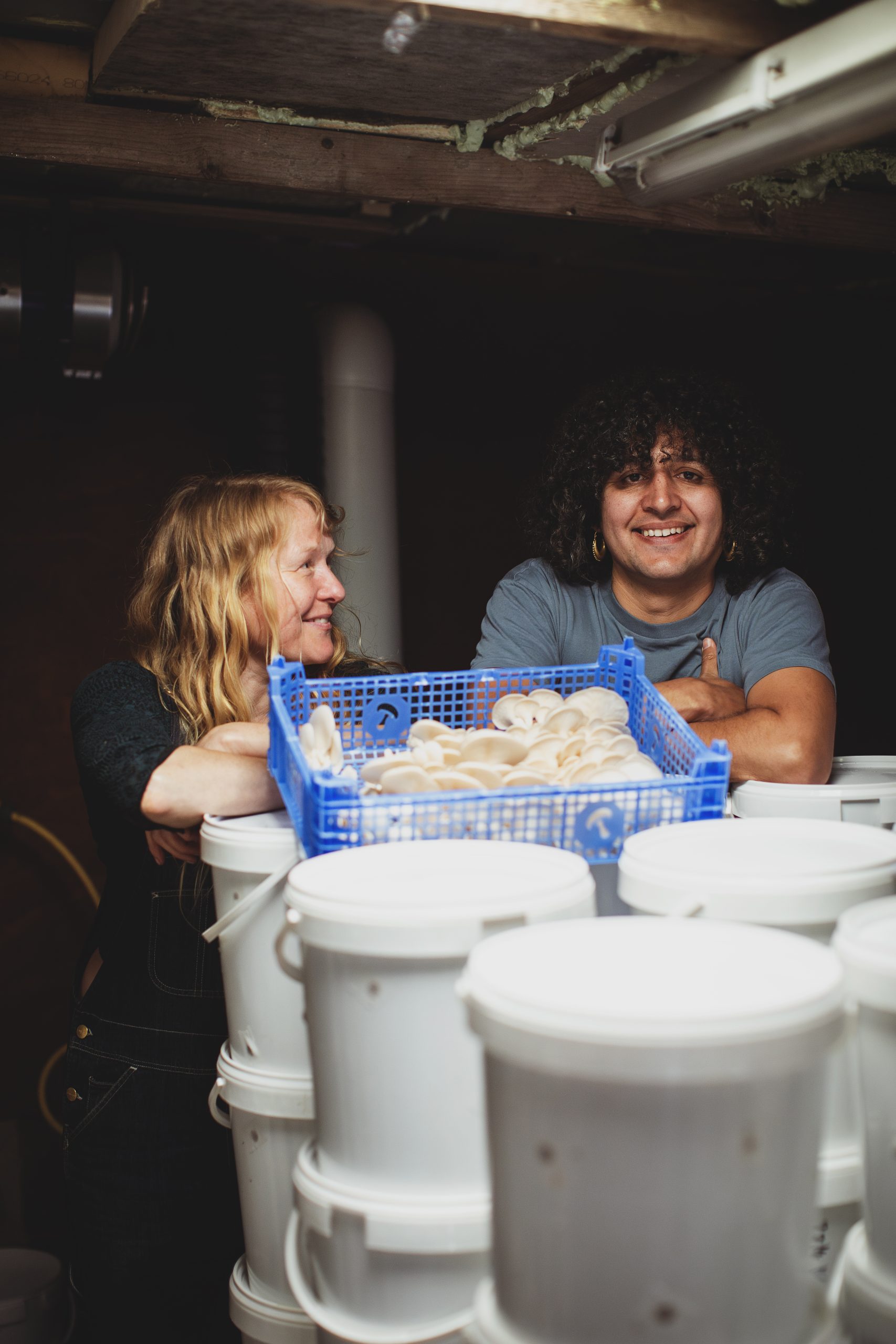
cee-cee manrique & Emma Stevens
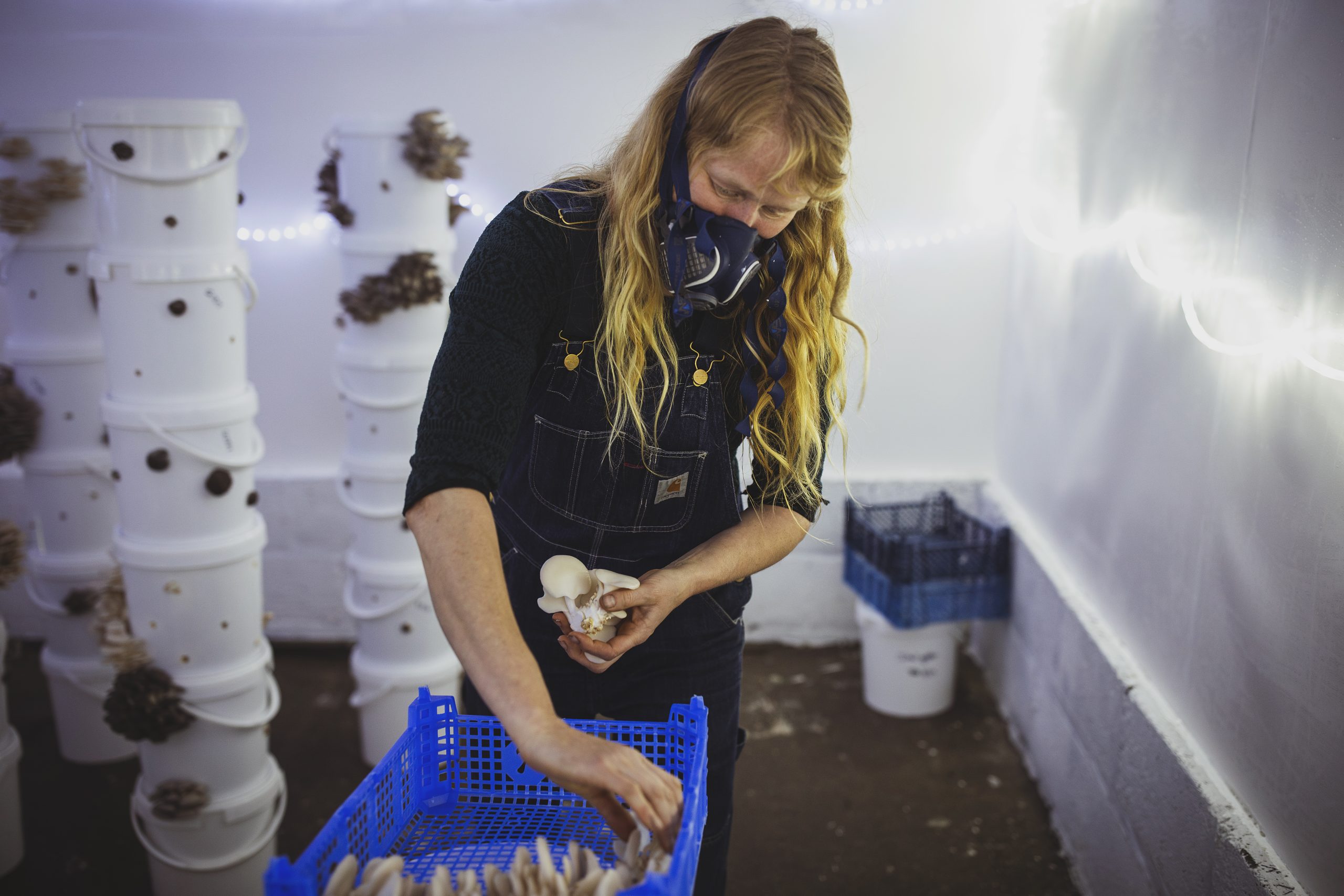
Emma packs Oyster mushrooms
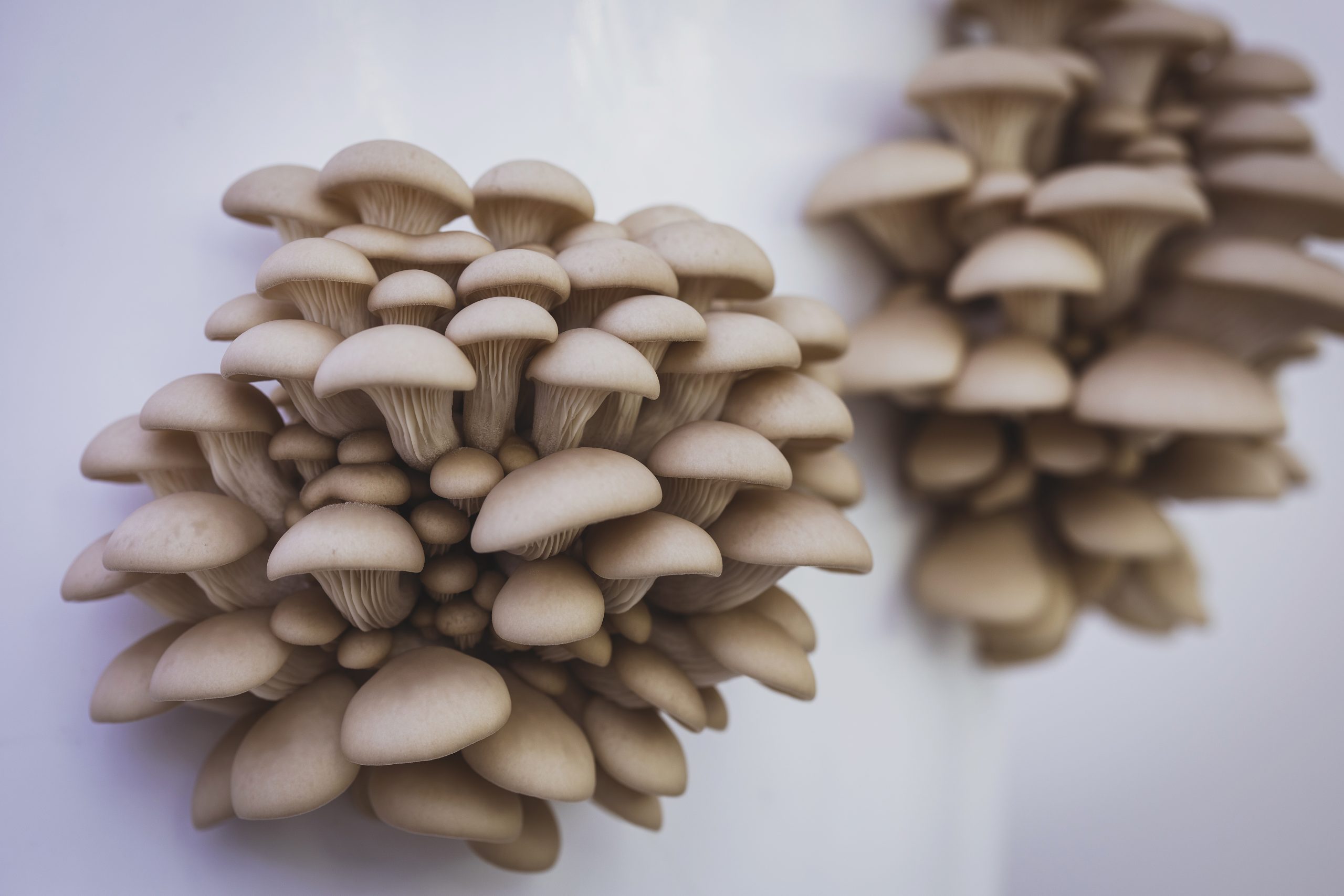
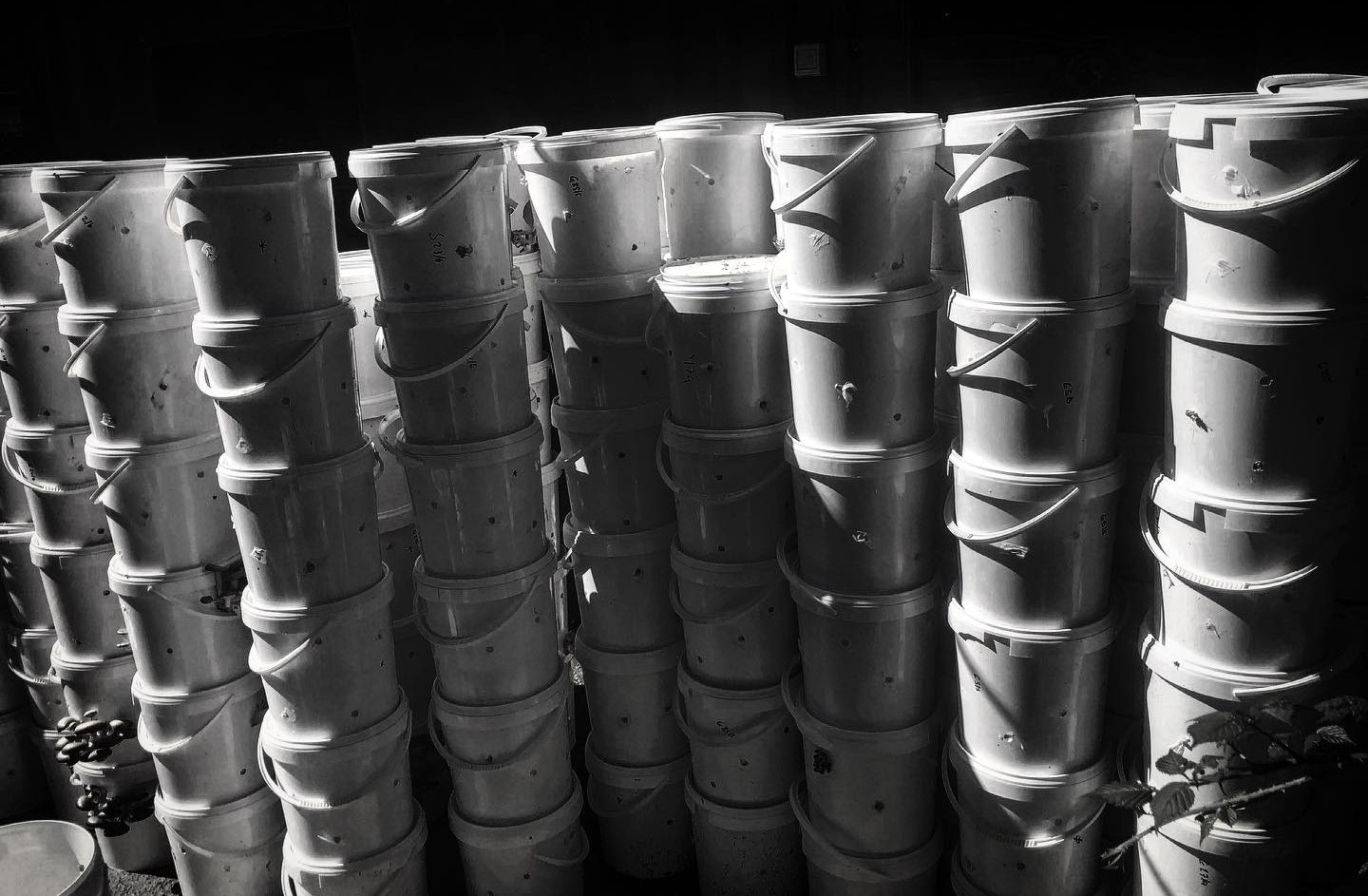
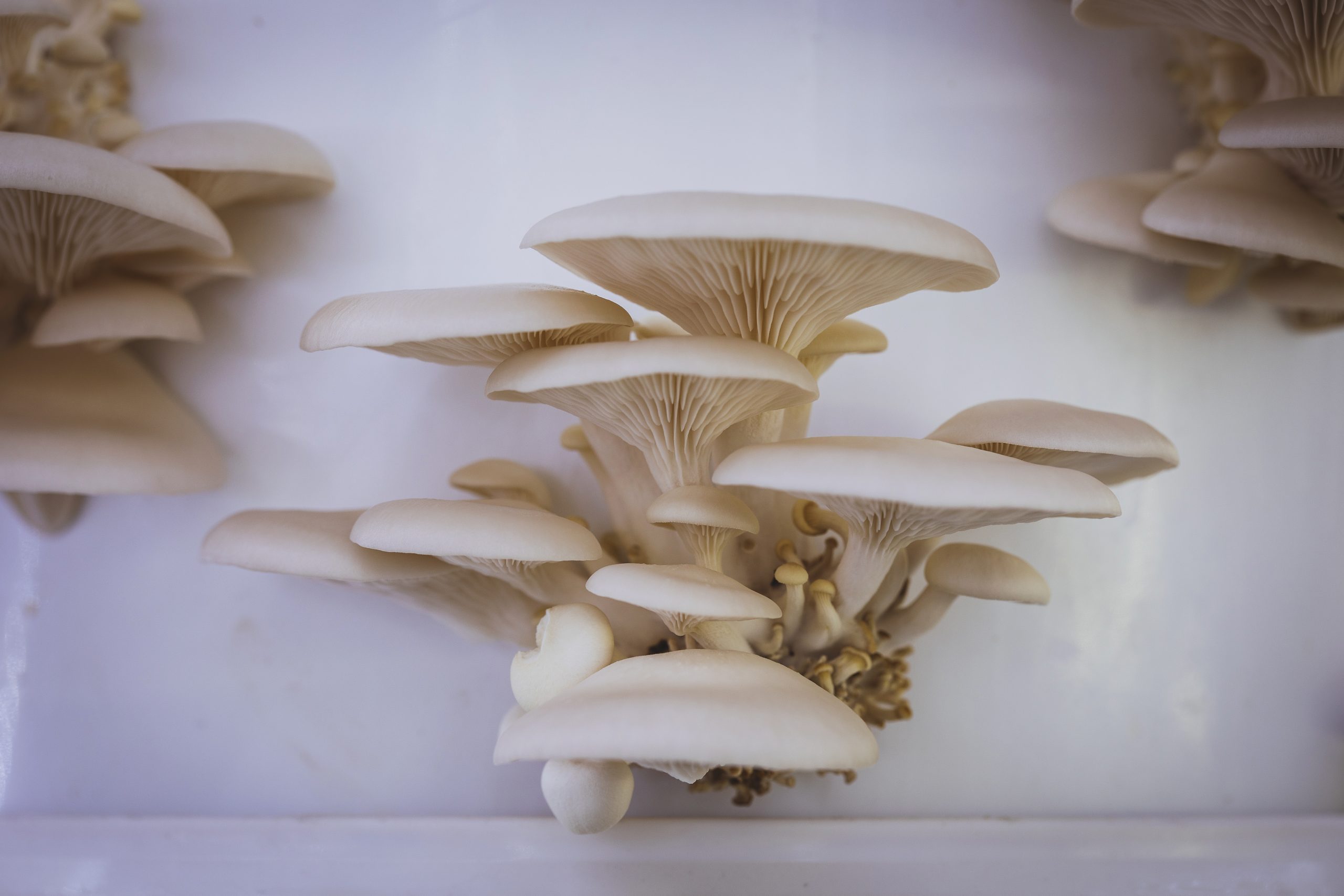
We watch as Emma and cee-cee harvest clusters of mushrooms, breaking them off gently and placing them carefully into blue creates. It is quite wondrous to behold – beautiful, high-value food grown without waste. We stand out of the way as cee-cee and Emma go about their normal sorting and packing routine, getting orders ready to take off to local restaurants, organic shops and individual customers. Business is going well and demand is high – we get the sense that they can never grow enough to meet it. As we walk around the land they manage later on, there are trees maturing, logs inoculated with Shiitake, wonderful diversity, an abundant polytunnel that Emma tends and the vegetable beds are thriving with the help of a mulch of spent mushroom-growing substrate. The land, they say, is slowly growing from a bare field toward a maturity and a verticality with many layers and a richness of life.
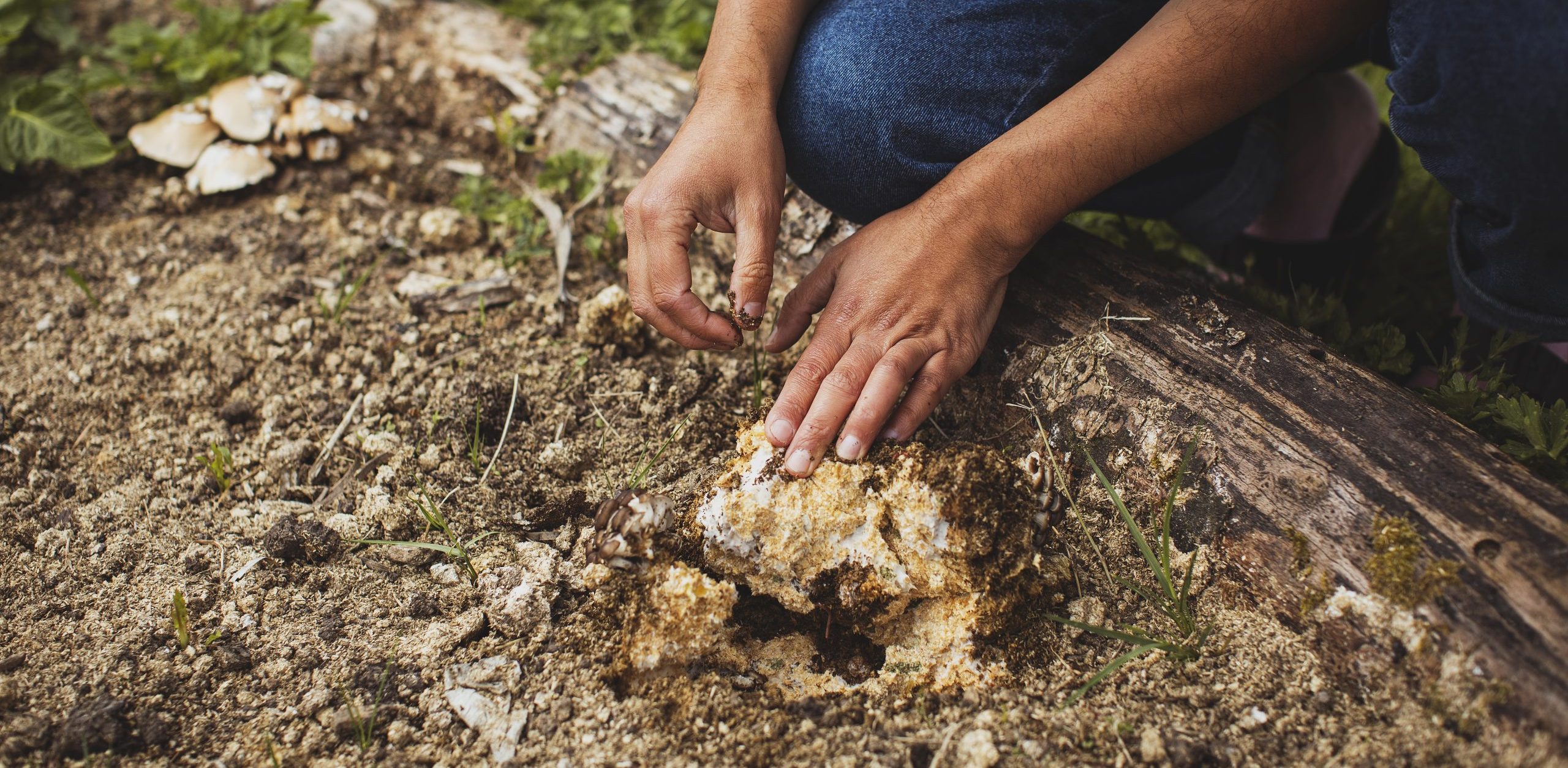
Spent mushroom substrate
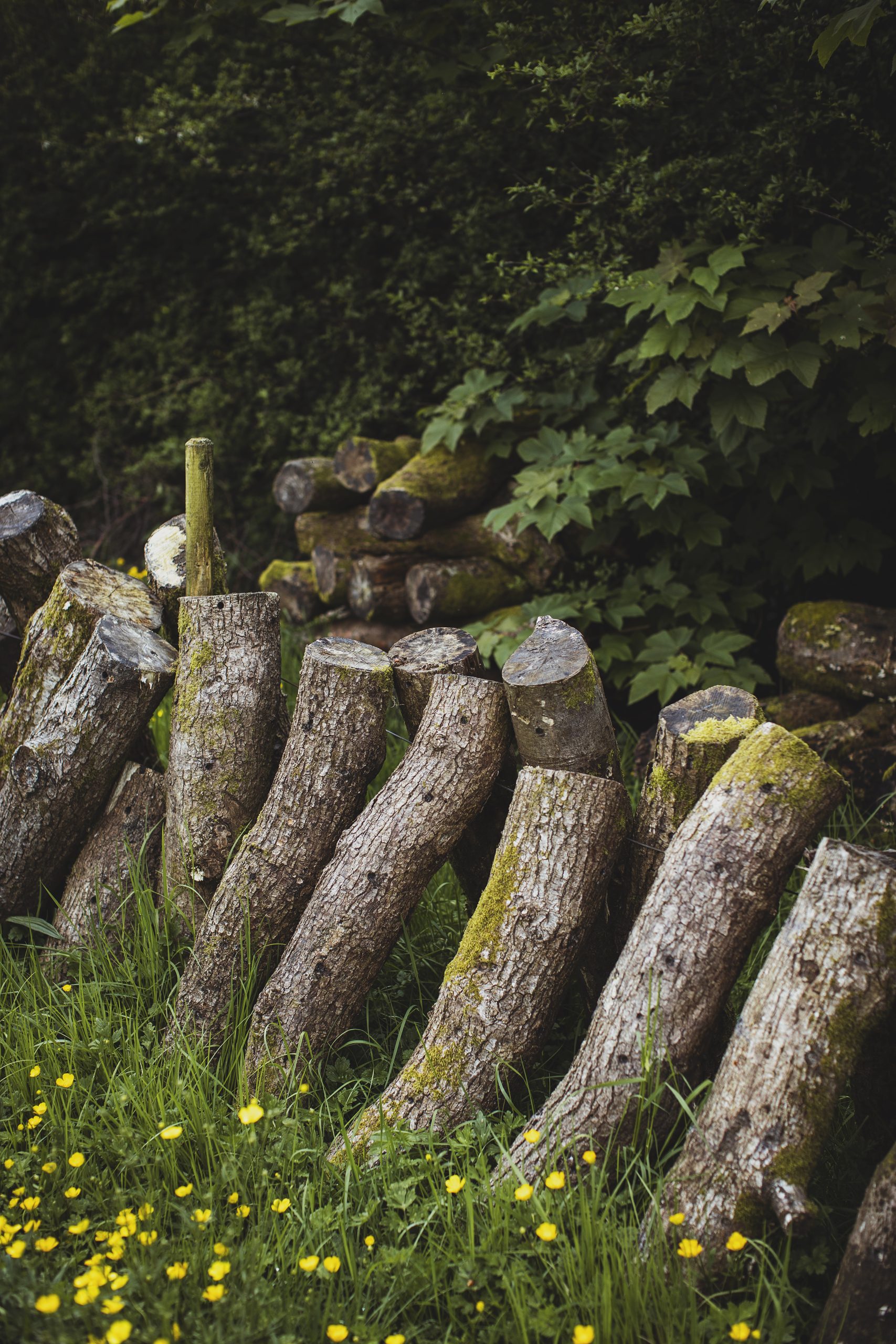
Spent mushroom substrate
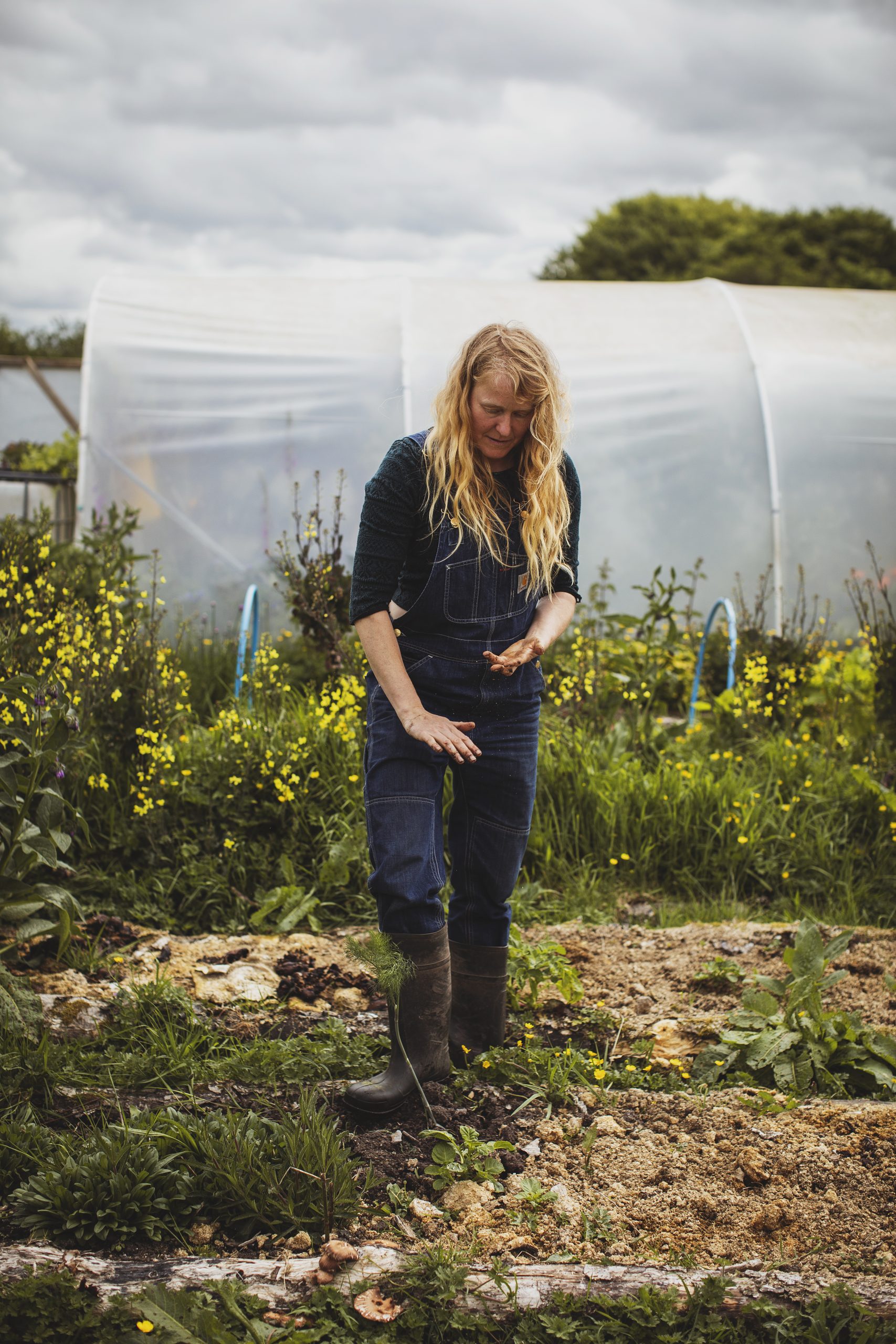
But it hasn’t been an easy road to get there.
Aside from the significant challenges of farming mushrooms and producing a consistency of supply in Welsh conditions, marketing what is often considered a luxury product, dealing with losing crops to issues like Trichoderma mould, the success cee-cee and Emma are experiencing now has come in the face of incredible personal barriers and challenges.
“Today I get the chance to sit here and reflect, feeling safe, with a functional business. My house is less likely to blow away!”
cee-cee manrique
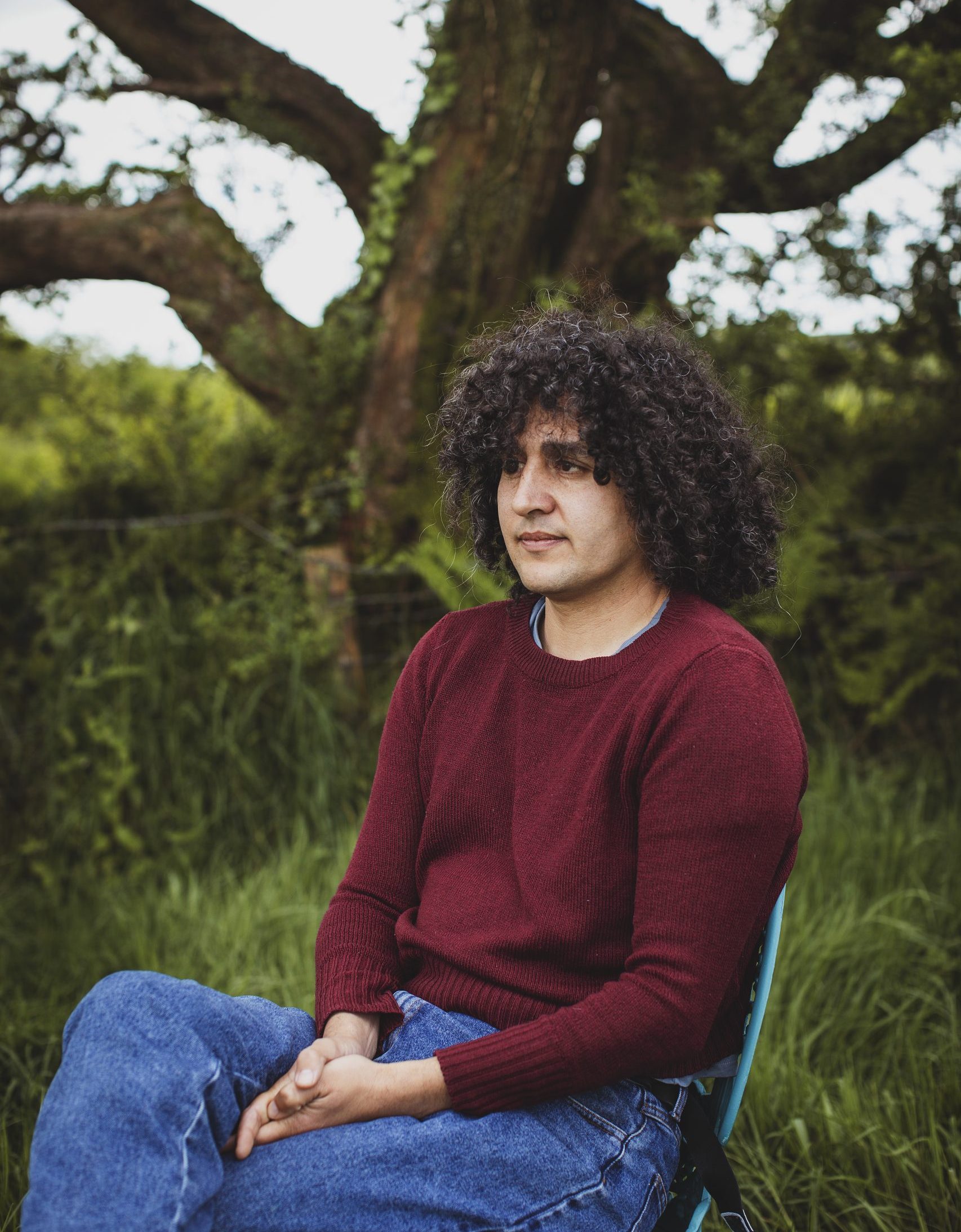
“Our biggest success has been surviving the last 4 years, with managing chronic illness. I spent a lot of it in bed unable to help in any way” cee-cee has been living since 2020 with debilitating Long-Covid. It was the hardest of times – “there were some really hard moments of loss, and not knowing how I’ll get through the next few days, weeks and months.” Emma had to work multiple jobs to support them and the business through that time, and as a carer for cee-cee, too. Ferocious wind storms and almost losing their home only added to a sense of precarity and insecurity.
But it is the land, cee-cee says, and the glorious moments of joy that have helped them through: “Today I get the chance to sit here and reflect, feeling safe, with a functional business. My house is less likely to blow away!”
We are sitting down, old friends by now, under a uniquely large hawthorn tree that stands strong against the winds of time and watches over the home cee-cee and Emma share. A calm contentment comes over cee-cee, looking out across to the Preseli hills, and we share a joy in Heather and I being the first visitors to the mushroom farm for a long time, and how that reflects an up-turn in cee-cee’s health. An outbreath of relief, reflection, warmth.
cee-cee and Emma came to farming and landwork through volunteering on farms and food growing in the ancestral lands of cee-cee’s father’s family line in San Juan de Rioseco, Colombia – “We haven’t looked back since.” They came to Wales in 2016 and after volunteering on a few more farms, found themselves in the Cardigan area, where Hyphae Mushrooms started life in an airing cupboard, before briefly moving into the dis-used holding cells of the old police station! They landed on Mountain Hall farm in 2018 where, as well as their fruiting chambers, manage two acres of land.
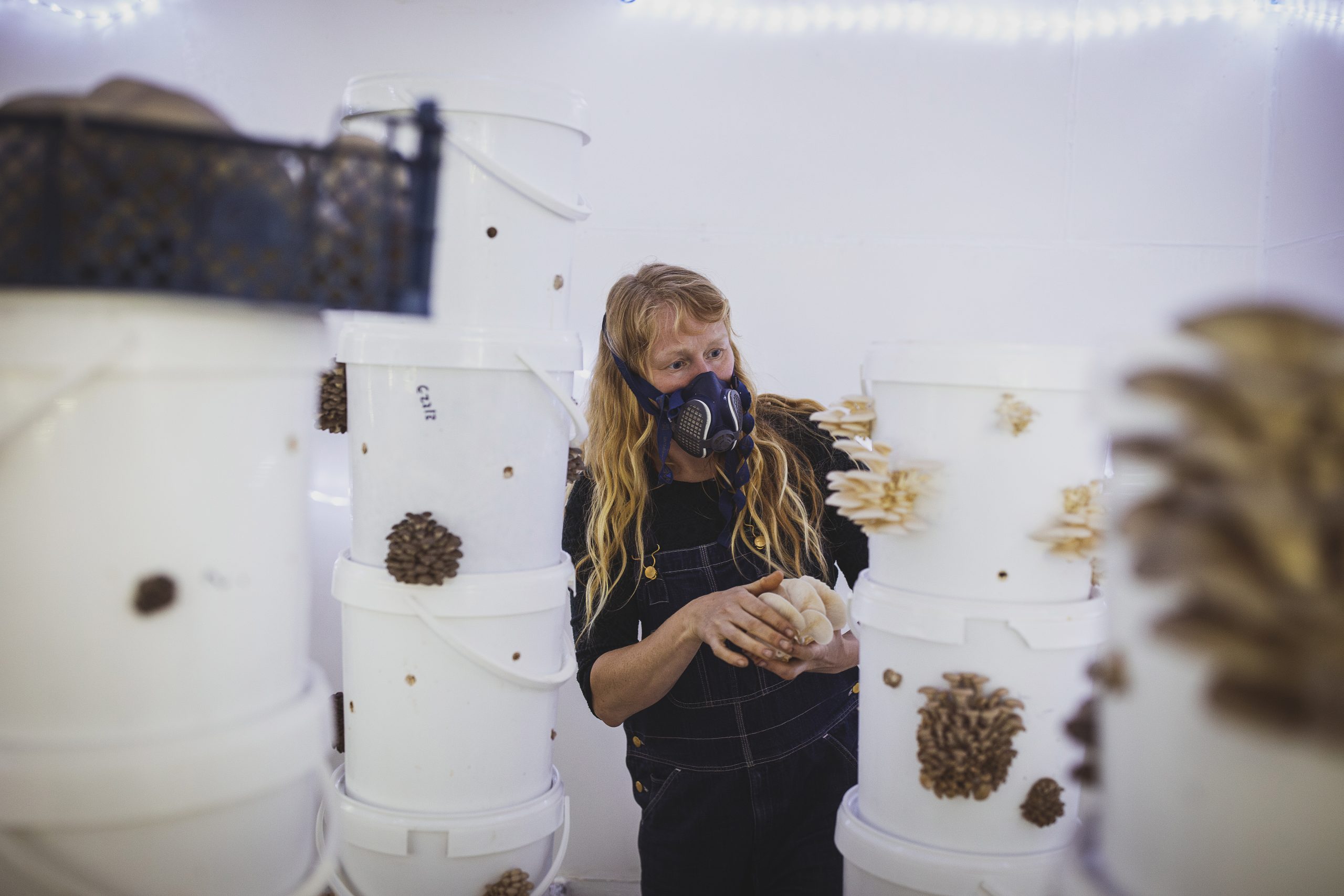
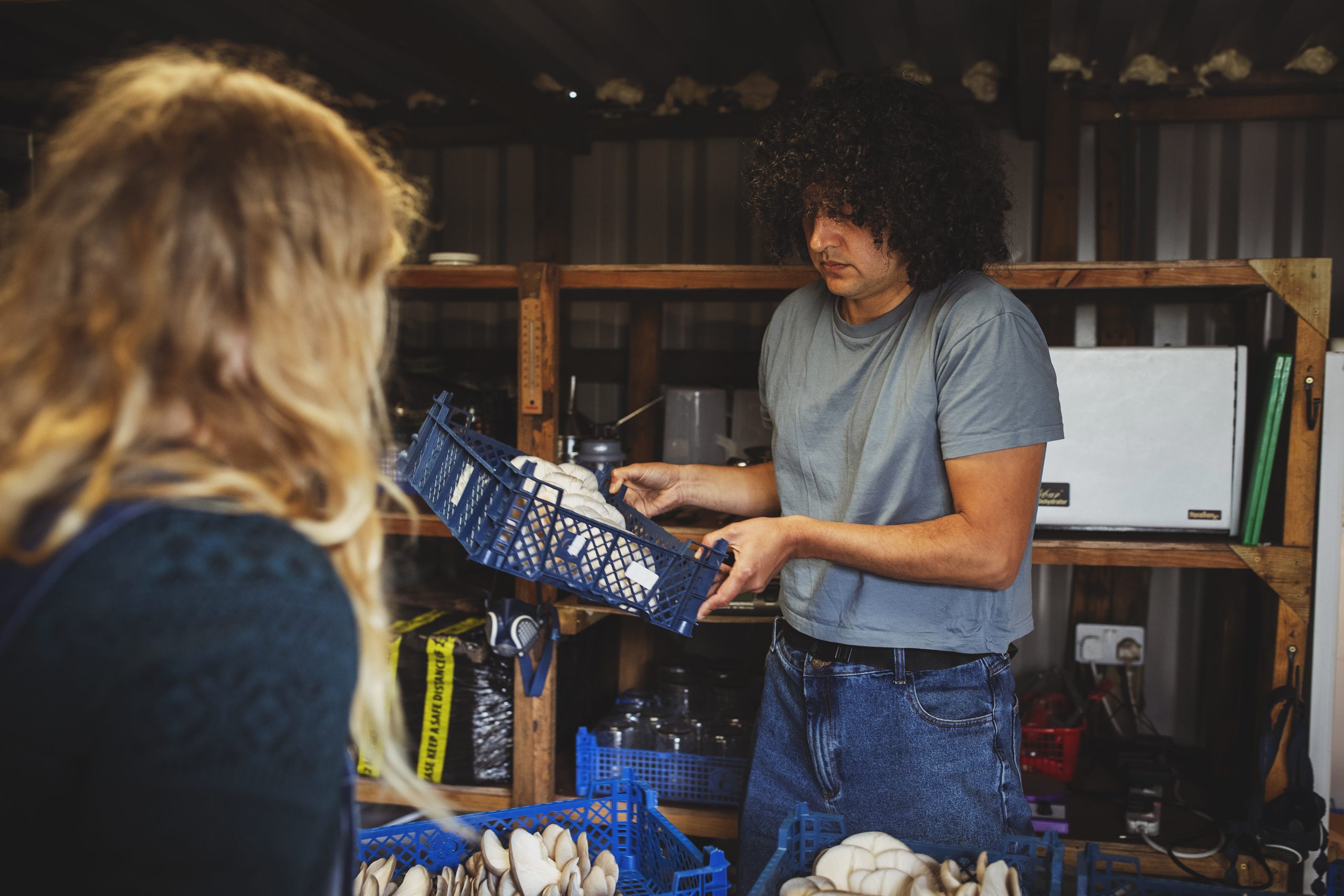
cee-cee knows better than most the barriers to making a life in food and farming, and credits naivety, luck and privilege – their own and proximity to others – for being able to set up a mushroom farm in the way that they have; “We have access to land, which feels like a miracle – people like us usually don’t”.
“As I slowly get to know people in the area, you get to know who owns the land. It’s handed down through families. It’s locked down” cee-cee says, shedding light on the structures and systems that limit access to the land. “I think if you own land, you are already in a place of immense privilege and I think it’s incumbent on those who do own land to allow access to people who don’t” cee-cee asserts, in the same breath as celebrating the access they were provided by the owners of the land they live and farm on, and what they describe as a ‘transfer of wealth with no conditions’ – “There needs to be more of that”.

“We have access to land, which feels like a miracle – people like us usually don’t.”
cee-cee manrique
“The most important organisation in the UK regarding land issues, in my view, is LION (Land In Our Names) – anyone who can, should support them, give them money no questions asked.” LION are working towards land reparations in the UK and to address the inequalities in access to land and food for BPOC people. “The borders of all of these fields are tied to that [colonial] history – you don’t have to go far to find the colonial roots of land ownership.”
LION were our collaborators on the Jumping Fences report, a research project we collaborated on with the Ecological Land Cooperative, led by researcher Naomi Terry. The Jumping Fences report identified this and a wide-range of barriers and challenges that BPOC landworkers face in Britain – not least access to land.
Not only is cee-cee less likely to be able to knock on a door and ask for some land to grow on in the way that a white landworker might, they are also more likely to be questioned as to why they are there or face assumptions that they are doing something they shouldn’t be because of their appearance. They’ve experienced casual racism in local pubs and walking around the countryside and tell me about times they’ve felt unsafe, or unwanted, referencing one incident, just metres from where they live and grow food, where a woman walking a dog made them feel very unwelcome – like they shouldn’t be there – “the countryside is hers, not mine”, cee-cee laments.
“Some people are experiencing overt and aggressive racism, for example in a local pub, on work exchange farms, or at agricultural university. Many people experience the cumulative effects of microaggressions throughout their lives, and the impacts of working in isolation from their communities and culture of heritage.”
Naomi Terry, Jumping Fences
I ask cee-cee about a social media post they had recently published, in which they challenged the idea that all you need to succeed in agroecological farming is a ‘can-do’ attitude. Whilst cee-cee understands those characteristics are important, for them it completely ignores the material, societal and structural barriers for so many to become agroecologcial farmers – particularly for BPOC and trans farmers like them. A ‘can-do’ attitude is not much use if you can’t afford or access land, says cee-cee, challenging a pervading idea amongst some landowners in the agroecological community that ‘if I can do it anyone can’, often neglecting to mention or acknowledge the layers of privilege – financial, material and historical – that underpin their success. “Yeah we can have a ‘can-do’ attitude, but when the baseline is ‘the countryside isn’t for you’, it’s definitely not enough. We’ve had a strong work ethic and a ‘can-do’ attitude, but for years I couldn’t do anything (due to chronic illness)”.
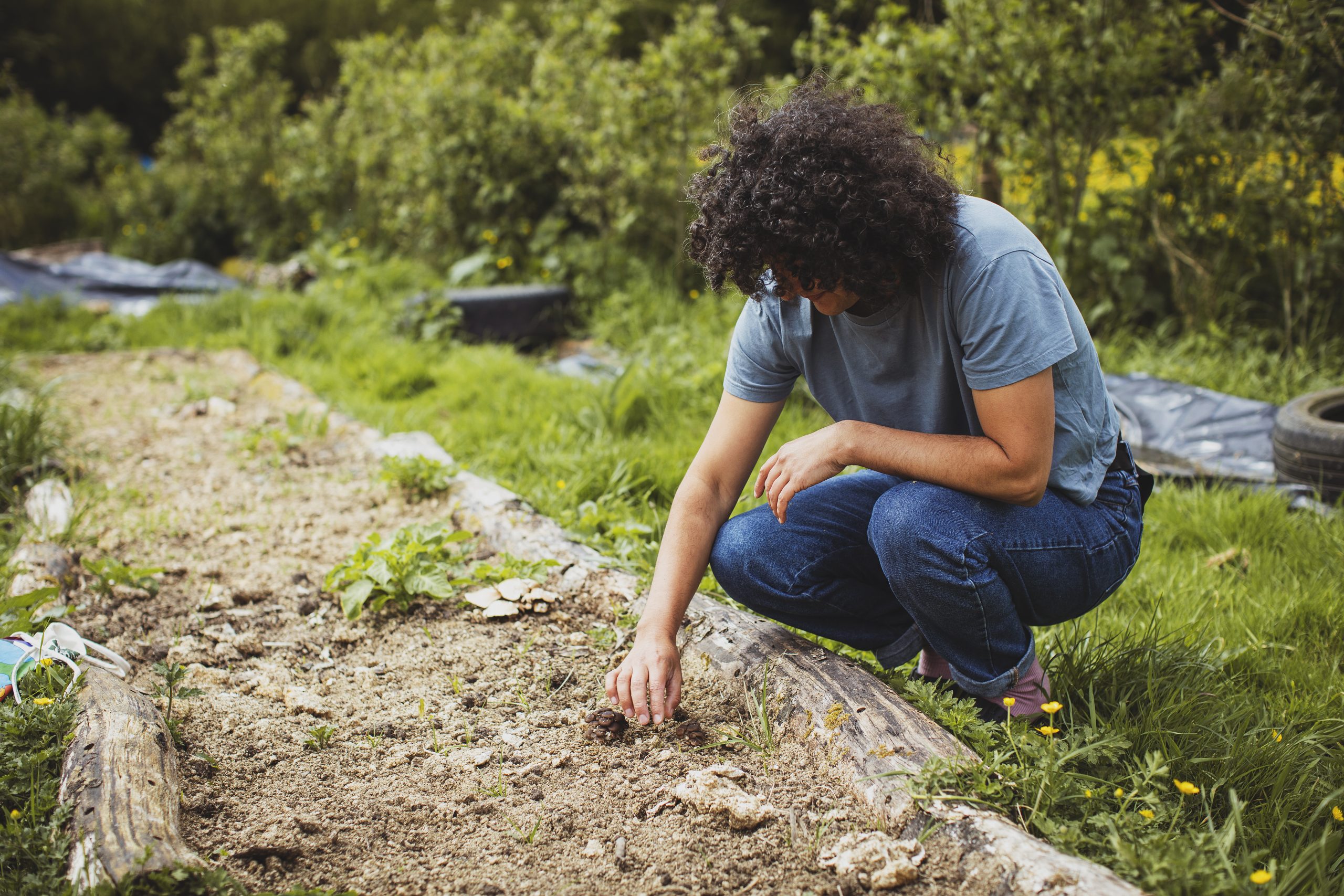
cee-cee manrique
“Yeah we can have a ‘can-do’ attitude, but when the baseline is ‘the countryside isn’t for you’, it’s definitely not enough.”
cee-cee manrique
But cee-cee is clearly someone who lives in the beauty and hopefulness of the land, and finds solidarity, encouragement and support in the Landworkers’ Alliance, LION and in campaigns for access to land, financial equity and fair pay for agricultural workers; “In the thick of Long-Covid – we wash a lot of buckets on the farm – we applied for some money from the LWA solidarity pot and bought a dishwasher. It literally saved our lives. I don’t know where else we would have got that money from.”
A few weeks ago, cee-cee attended their first meeting with REAL (Racial Equity, Abolition and Liberation in Landwork) a group for Black and People of Colour (BPOC) members of the Landworkers’ Alliance. Not only did they find strength and resilience sitting in a room with fellow BPOC landworkers, but in a recent message emphasised how well the member organisers in REAL held space at the impossible and terrifying time of the recent racist riots. They appreciate, too, how being a member of the Landworkers’ Alliance helps them feel represented; “I’m sitting here being given a platform by the LWA to use my voice. You can’t be what you can’t see, right. Maybe through the LWA this might find someone else who wants to be a mushroom farmer.”
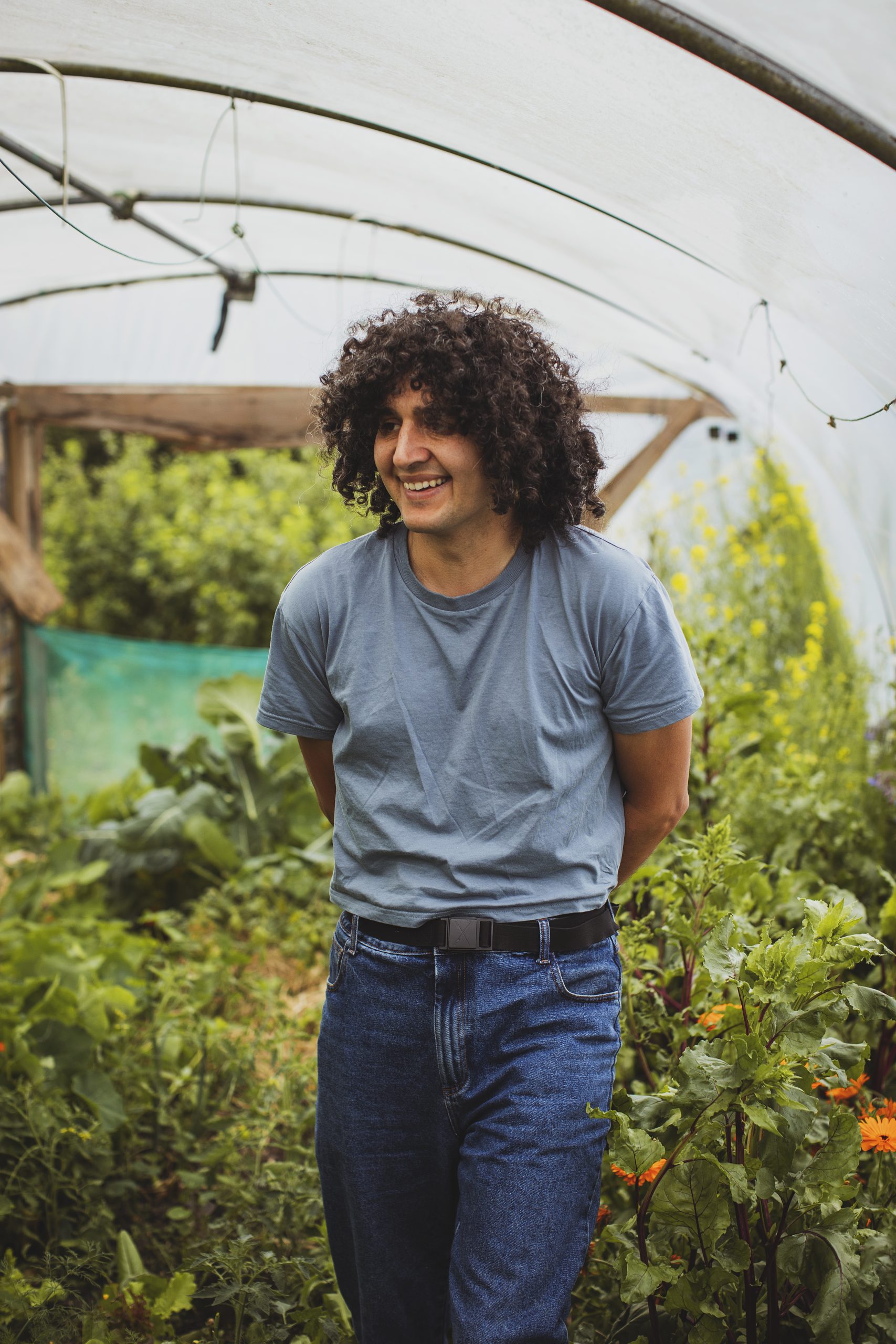
cee-cee manrique
“We wouldn’t necessarily have been able to buy our own mushrooms – they would have been a treat. That feels weird..”
cee-cee manrique
cee-cee mentions the Basic Income for Farmers campaign as an exciting step in the right direction for addressing some of the harsh economic realities for small-scale agroecological growers, farmers and food producers in the UK; “We wouldn’t necessarily have been able to buy our own mushrooms – they would have been a treat. That feels weird.” They tell me about the horrendous process of applying for government support when they were disabled by Long-Covid, and how with access to something like a basic income payment to alleviate financial stress, they may have gotten well quicker “I think there should be a basic income for everyone, but I think farmers would be a very good place to start. Straight off the bat that would provide access for those who don’t have it.”
Fundamentally, for cee-cee, the heart of agroecology is right treatment of the land, farming that does no harm, not driven by profit, but by the need to regenerate the land that we are damaging; “Agroecology is a practice in which we don’t allow ourselves to cause harm to other beings. I look out over the hills here and I can see scars, where the slurry is running, rivers polluted”.
And what I hear from cee-cee under this old hawthorn tree, is that paying people fairly to do the work that needs to be done, improving direct financial support for agroecological workers and improving access for BPOC landworkers could bring the people to the land who will fulfil that promise. Citing the book Disobedient Bodies by Emma Dabiri- which draws beautifully from African and Gaelic ways of being on the land, and reframes beauty as how we relate to the land – cee-cee concludes; “Beautiful people are made from the land. I just want to see more people find the beauty in themselves and enact it by being given access to land.”
Hear. Hear.
“Beautiful people are made from the land. I just want to see more people find the beauty in themselves and enact it by being given access to land.”
cee-cee manrique
To find out more about Hyphae Mushrooms, hear about their courses and follow their progress, check out their Instagram. You can browse the full photo collection from our shoot with Heather Birnie here.
To understand more about the issues highlighted in this article, read the Jumping Fences report here and about our ongoing racial justice work here. If you’re a BPOC farmer, grower or forester who has been affected by rural racism or similar barriers to access to land, we’d encourage you to think about getting involved with REAL or Land In our Names (LION).
*QTBPOC – Queer, Trans, Black Person and Person of Colour
Do you have a story to tell? Would you like to feature in our ‘Landtalkers’ series of member profiles like this one?
We are so proud of the work that our members’ are doing in the fields, woodlands, coastal areas, towns and cities of these lands. We think your voices deserve to be heard, and we want to celebrate the diversity, power and breadth of our movement, give you a platform to share what you are doing on land and demonstrate the possibility of agroecology at this moment as the great challenges of our times converge.
Are you active in your region – maybe you’ve got something to say about the challenges and opportunities where you are? We’d love to hear from new entrants or landless workers feeling their way into agroecology and understand what that’s like for you. Maybe you’re breaking new ground, forging into a sector where you don’t see people like you represented.
All sectors, scales and places in the supply chain – farmers, growers, sustainable foresters, land-based craftspeople, food processors, seaweed harvesters, millers, machinery operators and more…. We’d love to hear from you. Tell us your story or nominate someone on your farm, business, region, sector or from FLAME, REAL, OOTL or Wome



